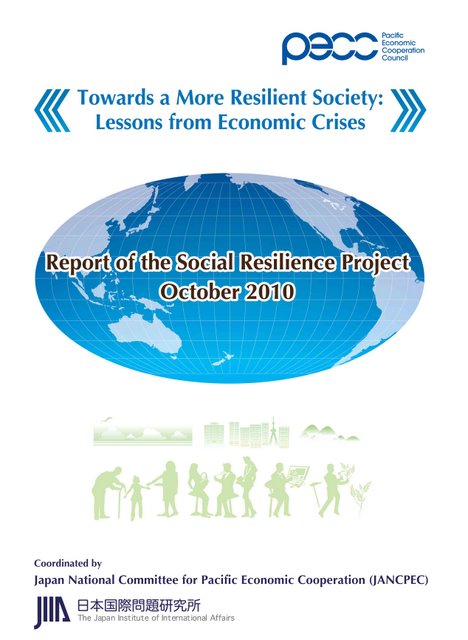Search our resources
default Towards a More Resilient Society: Lessons from Economic Crises (2010) Popular
By Mr Eduardo Pedrosa 1078 downloads
Social-Resilience-Report-2010.pdf
| Towards a More Resilient Society: Lessons from Economic Crises (2010) |  |
 |
 |
|
The SR Project consists of four teams – pensions, medical insurance, unemploymentinsurance, and macro analysis of savings/consumption – and each team comprises two to seven research members. This is the first time that PECC has addressed these particular social issues; heretofore it has been exclusively concerned with measures to liberalize and promote trade and investment. A financial crisis of a “once-in-a-century” scale has struck at the underpinnings of social safety in the Asia-Pacific region. The earlier 1997-98 crisis saw vigorous debates over social safety nets, but these debates quickly faded after 2003 because, with Asia’s export markets in Europe doing well at the time, the crisis was overcome simply by pursuing the liberalization of investment and trade. The situation this time is different in the sense that market conditions in Europe and the US are worse than in Asia, inspiring little hope for economic growth by relying on exports to these economies. On the other hand, we are in a similar situation to the previousfinancial crisis in that the debates over social safety nets are about to fade again as the economy in this region starts to recover, led by the robust development of emerging markets in Asia. Many economies in this region are gaining economic impetus by increasing exports to developing Asian economies. Economic crises have hit our economies almost every ten years during the past two decades. Being aware that we must consider not only economic rescue policies in the short term but also the resilience of infrastructure against frequent economic crises in the long term, we launched the Social Resilience Research Project (SR Project) last year as a PECC International Project. The SR Project is designed to shed light on the importance of social safety nets and to closely examine the mechanism of their roles in the domestic economy. This topic has never been discussed in depth among APEC economies. Overly focused on the liberalization of investment and trade, APEC has let slip opportunities to discuss the sense of security of those persons who underpin liberalization and brisk domestic demand as well as social safety nets for them in connection with a major paradigm shift toward the construction of a resilient model for sustained economic growth. In this regard, the SR Project is a very good opportunity to focus more on the social and living conditions of people and to share good or bad practices for social safety nets in the Asia-Pacific region. Comparative research on the actual status of Asian social safety nets would definitely be useful if we are to make our society more resilient against economic crises that may occur again in the future. The economies in this region are recovering steadily, and now is the time to pay more attention to organizing domestic social safety net systems. Instead of missing this opportunity again as we did in the late 1990s, we should highlight the significance of constructing a resilient society and take action as soon as possible. Download report: |
Recent Uploads
State of the Region Report 2023-2024
PECC Statement for APEC MRT 2023
PECC Update for APEC SOM 2 2023
PECC Signature Project: Opportunities for Supply Chain Decarbonization in APEC Economies
PECC International Project: Understanding Digital Skills in the Digital Economy Era
PECC Signature Project: Primer on Economic Integration Issues posed by the Digital Economy
State of the Region: Special Report on Covid-19
Pacific Currents
Global value chains: From fruitful discussions to meaningful actions
Juan Navarro, Associate Faculty, Royal Roads University
Climate change in SOTR
Christopher Findlay, Tilak Doshi and Eduardo Pedrosa
Digital Technologies, Services and the Fourth Industrial Revolutions
Submitted by Jane Drake-Brockman, Christopher Findlay, Yose Rizal Damuri and Sherry Stephenson
COVID-19 has Exposed Major Gaps in our Social Safety Nets: In a Post-COVID World Will these Gaps be Closed?
Hugh Stephens
Vice Chair, CANCPEC; Distinguished Fellow, Asia Pacific Foundation of Canada; Executive Fellow, School of Public Policy at the University of Calgary
Multilateral Cooperation is a Safeguard against Pandemics
Rebecca Fatima Sta Maria
Executive Director, APEC Secretariat
International cooperation during COVID-19
Sungbae An
Senior Research Fellow, Department of International Macroeconomics and Finance, Korea Institute for International Economic Policy (KIEP)
Drastic measures to stop spread of COVID-19 are necessary
Charles E. Morrison
Adjunct Fellow and Former President of the East-West Center; Former Co-Chair, PECC
ASEAN-China cooperation in time of COVID-19 pandemic
Jusuf Wanandi
Vice Chair, Board of Trustees, CSIS Foundation; Former Co-Chair of PECC

 Two major economic crises have hit the Asia-Pacific region in the past 13 years. Our society has to be resilient against these economic shocks. To facilitate discussions on the development of social safety nets in this region, the Japan National Committee for Pacific Economic Cooperation (JANCPEC) launched the Social Resilience Research Project (SR Project) in 2009 as a PECC international project.
Two major economic crises have hit the Asia-Pacific region in the past 13 years. Our society has to be resilient against these economic shocks. To facilitate discussions on the development of social safety nets in this region, the Japan National Committee for Pacific Economic Cooperation (JANCPEC) launched the Social Resilience Research Project (SR Project) in 2009 as a PECC international project.